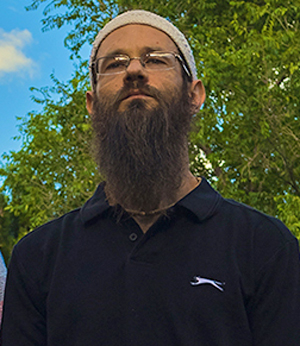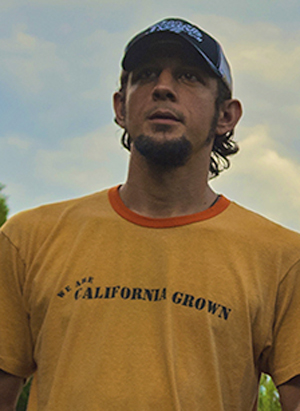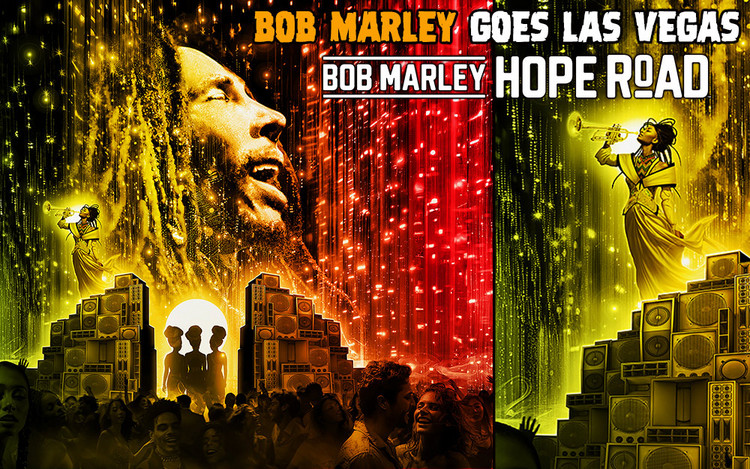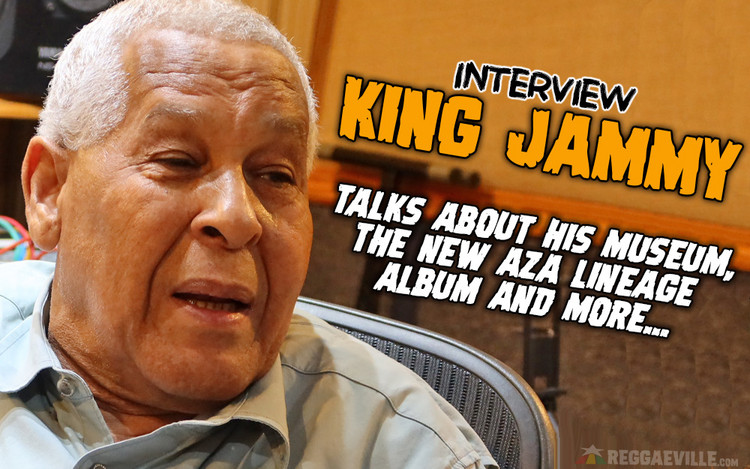Groundation ADD
Interview with Harrison Stafford & Marcus Urani | Groundation
11/09/2014 by Valentin Zill

Having just finished an extensive North American tour, Californian reggae-jazz fusionists Groundation present their eighth studio album, called A Miracle. Valentin Zill called their lead singer Harrison “Professor” Stafford and keyboard player Marcus Urani in Paris, where the group prepared for another European tour. Read what they have to say about their latest album, how they got to feature Marcia Griffiths and Judy Mowatt on it, why they like returning to tour North America, and the various side projects they’re working on.
Professor, earlier this year you released an album called Natty Will Fly Again which you had recorded with Ashanti Roy, Pablo Moses, and Winston Jarrett. How did it come to that collaboration?
Professor: I've known those guys for a long, long, long time. When we started with Groundation and started Young Tree Records, the first three releases we did was a release of Pablo Moses' Pave The Way into the digital world, a release of the new Congos album, and a release of Winston Jarrett's compilation. So working back with these singers ten, twelve years later, it was just like a full circle for me. Winston Jarrett's been living in the States for a long time, Pablo Moses I knew from when he used to tour when I was a teenager, and The Congos of course, I've known Cedric Myton and his family for a very, very long time as well.
Despite all the projects you're doing with Groundation, you still seem to feel obliged to go back to the reggae roots and do it old school. Whether we talk about your documentary Holding On To Jah, or the stuff you're releasing under the name of Professor. Is that like an urge for you to go back recording roots reggae as rootsy as it can get?
Professor: Yeah, I'm a part of it for sure. I love that. I love those musicians. You know we're speaking in a sad moment when we lost Style Scott. Style Scott was murdered just a few days ago. I love playing music with these brilliant foundation people that I grew up listening to. So yeah, it's definitely me wanting and taking great pleasure from playing roots reggae music. Because that's really where the roots of Groundation is. It's militant music, music with a social message, and it has to be played with that revolutionary spirit. And that revolutionary spirit, reggae music, it comes from Style Scott and Horsemouth Wallace and Sly Dunbar, Robbie Shakespeare and Family Man and Flabba Holt. It comes from these people. It's a great pleasure for me to play with them.
It also seems to be a great pleasure for you to play with your colleagues from Groundation.
Professor: Yeah. Marcus (Urani; the editor) is just coming in.
Hi Marcus!
Marcus Urani: Hi, how are you doing?
When you announced the release of your last album, you said that the next one was gonna be about the “great female spirit”. Can you tell me more about that? Where does the “great female spirit” manifest on A Miracle?
Professor: Yeah, for sure, that became the focus for the album early on. For me personally, just getting married and having kids the last couple of years was a great inspiration. And it's something that we in Groundation – since we've had Kim (Pommell; the editor) and Sherida (Sharpe; the editor), different girls from Jamaica, it's a part of the whole Groundation process, that balance. So to feature the female voice along with my male voice, it's something that we've always wanted to do. This album, this focus on the female spirit really gave us the opportunity to do that, as well as to feature female lead vocalists Judy Mowatt, Marcia Griffiths. And then the lyrics and the focus of all the content really became straightforward, the balancing of the powers and the females' great gift of the creation of life and females' inspiration behind lots of men and the works that we as males do. And that miracle of life, which is the miracle for us of creating music. And the miracle the album is talking about, which is a hopeful miracle for the future, for humanity. So I think the female spirit really gave us that focal point.
The album comes with great artwork that speaks to that, too. It's been done by Neville Garrick.
Professor: Ya, and his son Nesta. The two of them work together as a team.
This was the first time that you worked with them. Professor: I think it was just time for us to do it. Giovanni Maki, my childhood friend, did all the albums – Young Tree, Each One Teach One, Hebron Gate, We Free Again, Upon The Bridge, Here I Am, Building An Ark, all the way through. And it was just getting difficult, time and responsibilities, Giovanni had other places. He's a full time editor of the Medical Magazine and the chief graphic designer for it, happens-every-weekly-thing. So it was really tough for him to keep doing the albums. We knew right away that this album was not gonna be by Giovanni. We already knew that going into it. And Marcus and I were brainstorming people, and there's lots of talented artists there. It just happened that we toured Australia, and bumped into Nesta Garrick back in January or something. I was like, wow, Nesta, what about your father Neville, is he still doing artwork? And he's like, yeah, he's in L.A. doing graphic design. So right then we knew it was a great opportunity to work with Neville Garrick, somebody who's done such great albums – of course all the Bob Marley albums and Burning Spear and Bunny Wailer. We must try. As soon as we had the link with Neville Garrick, we say we got at least to see where this is gonna go. And it obviously went to a beautiful place, and the album's artwork and design is phenomenal.
Professor: I think it was just time for us to do it. Giovanni Maki, my childhood friend, did all the albums – Young Tree, Each One Teach One, Hebron Gate, We Free Again, Upon The Bridge, Here I Am, Building An Ark, all the way through. And it was just getting difficult, time and responsibilities, Giovanni had other places. He's a full time editor of the Medical Magazine and the chief graphic designer for it, happens-every-weekly-thing. So it was really tough for him to keep doing the albums. We knew right away that this album was not gonna be by Giovanni. We already knew that going into it. And Marcus and I were brainstorming people, and there's lots of talented artists there. It just happened that we toured Australia, and bumped into Nesta Garrick back in January or something. I was like, wow, Nesta, what about your father Neville, is he still doing artwork? And he's like, yeah, he's in L.A. doing graphic design. So right then we knew it was a great opportunity to work with Neville Garrick, somebody who's done such great albums – of course all the Bob Marley albums and Burning Spear and Bunny Wailer. We must try. As soon as we had the link with Neville Garrick, we say we got at least to see where this is gonna go. And it obviously went to a beautiful place, and the album's artwork and design is phenomenal.
With all the touring you do, and a family at hand, I guess it can be difficult to find the time to take to the studio.
Professor: Yeah, but at the same time, inspiration is always there. It's almost like, yeah, you have responsibilities and you have family now, but it's almost like out of that, you have a new creative spirit. So maybe it doesn't take as long, and then the lyrics and the overall album's arrangements and compositions, they come about quicker, because there's more spirit behind it, I found. So there's less time, but the time is more productive.
How much time did you spend in studio to record A Miracle?
Marcus: We did a couple of months, really. The initial recording we did in days, three or four days, just with the quartet. And then it took about two months probably – over a two months period, we were touring a little bit during that time. There's never a straight moment. We're rough now on touring and do a little one-offs, we've done in South America and such, but... Yeah, it's about two months.
To which extents were your ideas developed before you went to studio?
Marcus: We had rehearsed quite a bit of time. We had come together over the last, maybe six months prior to that.
Professor: That's how we do all the albums. We don't wanna go and waste studio time. We all get together to record an album, we better be ready to press the red button and get the takes and things we wanna do.
Marcus: Yeah, we build the music up and we're ready by the time we're recording.
Where did you record A Miracle?
Marcus: In my house (laughs). Ya, we've been building our studio up for a while now. For the last previous albums, we would do the main recording with Jim Fox in the big studio, but this time, we did it all in my house. We had built up enough and learned enough to be able to do it in the house, and things were getting up. Every year, the technology gets easier and easier to do something like that. So it was time to do it. We were a little worried how it was gonna come out, but it came out great. It's a lot of work to do it that way, as well. But it gave us some freedom to really explore things and new arrangements, which was nice. We had some more time to be able to do things that we couldn't if we were in the studio. So it was great, it was great.
My impression so far is that there's quite a bit more jazz in A Miracle than on previous Groundation albums.
Professor: I don't know.
Marcus: That's funny.
Professor: I don't really know. It's just who we are. We definitely, as we talk in interviews and things before, we're definitely trying to create new things, to be creative, to come at the music from a different perspective than the previous albums and previous songs, so we're always exploring new areas. But because of our background, our tools and the ability to construct the songs have evolved over the time. Yeah, I guess it gets more jazzy. But as Family Man Barrett would say, reggae music played very well is very jazzy.
Marcus: Nice. It's been there from the beginning, too, you know. I mean you go all the way back to Young Tree and find moments that are very jazzy. I guess it's so hard to say what's jazzy and what's not. Yeah, I think like Harrison said, that's just a part of who we are, and it's always gonna be there. It's not put in on purpose or not taken out on purpose, it's just it comes out more sometimes and sometimes we're heading in different directions. It's there, it's always there.
How did you get in touch with Marcia Griffiths and Judy Mowatt for the combinations?
Marcus: We saw Marcia in Sweden, about a year before we did this. We see here sometimes on tour, she's out in the circuit there. She's out on festivals, you know. So we had talked to her then, and she was really excited about Groundation in general, and a really positive person. She had such an experience in the music. So I think when Harrison called her, she was excited and right away said, OK, let's go, when do we hit the studio? It was great. It's such an honor to work with both of those women. The legacy behind them, the connections to the whole roots reggae, it's just such an honor for us.
Professor: Marcia was really funny, cause I called her up from Jamaica there and I was like, you wanna be part of this project? And right away she was like, I'm ready papa, whenever you wanna go in the studio! (Laughs) Alright, alright, great. Judy Mowatt was, I think, a different thing. Because she wasn't, like Marcus was saying, in the circuit. So to have her on our record... Just like Marcia, she's very powerful and moving. But Judy hasn't sung reggae music in twenty, twenty-five years! So having Judy Mowatt on the title track, A Miracle – that was the person who I wrote that song for, really. So it worked out amazing. And to have this be her kind of re-emergence into reggae music. Hopefully she can come on and do some more stuff, she seems to have a new fire of inspiration after this album. So that's very special for me, personally, because I love Judy Mowatt so much.
So if you got Judy Mowatt to record for the first time in twenty-five years, I wonder why you didn't get Rita Marley as well.
Marcus: (Professor laughs) Everybody asks that.
Professor: Rita seems like a different nut to crack (laughs). We don't see Rita in the circuit. I've never talked to Rita Marley in my life. I hear she's in Africa living full time.
Yeah, in Ghana actually.
Professor: Right, not far away from you!
About three hours by car.
Professor: See, you could have been the link!
If only you had told me!
Professor: No, honestly, from the beginning we were thinking Marcia and Judy. So Rita... Musically speaking, I just know Marcia and Judy much, much more than I know Rita Marley. I know Rita Marley from the I-Threes, but I don't really know her solo work.
Marcus: We never had the thought of hey, let's get the I-Threes or something. We slowly became obvious that Marcia and Judy were right for those songs. That's what it was. It was perfect just having them two.
There are two new band members to Groundation.
Professor: Right, Sherida and Daniel.
How did that come about?
Professor: One of the singers, Kerry (Kerry-Ann Morgan; the editor), couldn't do the touring anymore and needed to be home in Jamaica. And Sherida, who is a friend of Kerry's and Kim's and from the same performing arts school there in East Kingston, she actually was one of the first singers in Jamaica who started learning the Groundation music in 2004, 2005, when Ikesha (Johnson; the editor) came on the road with us. So Sherida is our newest member, while at the same time she's been a part of the Groundation family for ten years. So she is new, but she is foundation. And Dan on the trombone – again, with Kelsey (Howard; the editor), it's hard to tour. It's hard to maintain that positive thing and take a great inspirational edge into every performance. It's not easy for everybody. Someone else needed to come in and take over that spirit. And Daniel Wlodarcyzk, the one who's playing trombone now and the one on A Miracle, is fantastic. He's a younger person, gives us different energy, and he's got a great positive spirit. And musically... Musically, he comes from a different world for a lot of music that we do. Which is good. A lot of us grew up listening to the same Meters and James Brown, the same Miles Davis stuff. To have somebody come in who is younger, who knows bands that we've never even heard of, is a nice thing happening.
Talking about touring, you did the Coming Home North America Tour in 2014. I can imagine that after having conquered the world more or less, it must feel special to play back home. Marcus: Yeah, it was nice to finally do the States again. It had been a long time since we went to many of those markets. We've been doing the West Coast every year. The East Coast we would hit sometimes, but a lot of those places we did, we hadn't done in six or seven years. So it really was coming home. It was a while. It was great to do, and great to see some fans we hadn't seen a long time, and meet some new people and spread the music around. We were able to make it up to Canada, too, which was great. We had some great shows up there. We did some really nice festivals all throughout the summer. Which was really cool to be a part of. Cause we see a lot of the same bands out in the European circuit and all the festivals here, but there were some different American bands that we hadn't seen. Playing on festivals with people like Blues Traveler or people from ten years ago was great.
Marcus: Yeah, it was nice to finally do the States again. It had been a long time since we went to many of those markets. We've been doing the West Coast every year. The East Coast we would hit sometimes, but a lot of those places we did, we hadn't done in six or seven years. So it really was coming home. It was a while. It was great to do, and great to see some fans we hadn't seen a long time, and meet some new people and spread the music around. We were able to make it up to Canada, too, which was great. We had some great shows up there. We did some really nice festivals all throughout the summer. Which was really cool to be a part of. Cause we see a lot of the same bands out in the European circuit and all the festivals here, but there were some different American bands that we hadn't seen. Playing on festivals with people like Blues Traveler or people from ten years ago was great.
What response did you get on the East Coast?
Marcus: Great, great. It's not huge numbers, but the people who come out really now the music and really love it and lots of energy. Lots of energy at the shows. That was a really nice response.
Professor: Sure. Beautiful.
Now you're about to tour Europe once more, pretty extensively.
Professor: Right.
What can we expect from that?
Professor: New music. With that comes new energy for us, new collective improvisations that we've never really done before on stage. It'll be very fresh for us, and I think the audience, too. Some of these places in Berlin and Paris we played many times. So to have new music both for the crowd and for us, I think it's gonna make it into a very lively... And the energy is gonna have a higher height because of it.
Professor, how did the crowd funding for Holding On To Jah work out?
Professor: It's great. We actually just finished the Indiegogo campaign and we're a couple of thousand dollars short of what we needed, but we made lots of the money for the licensing of the songs. So I can say for sure that the film is gonna be released 2015 on DVD and online. We got the funding that we needed, and we're gonna secure the rest of it. Looking forward to putting out this project that I put so much time and energy into, and finally it can see the light of day for people to really celebrate this culture. It's great.
Glad to hear that. Marcus, you recently did some recording for Martin Zobel & Soulrise's album Keep Planting Seeds, which they did in CA with Fully Fullwood.
Marcus: Yeah, it was great. We had met Martin over the years. He was always coming out to shows, we would see him out in Germany when we played there at various festivals throughout Europe. One time, about a year ago, I think it was our last tour here, we had been driving for like seventeen hours, we had a bunch of shows in a row, and we were going to Germany. And I get a call asking, the keyboard player for Martin's band is not able to show up, can you fill in? Can you learn their songs and play their stuff? I was thinking, oh God, really? OK, maybe... So we get there, we do our sound check. I stayed on stage and did their sound check with them, which was basically rehearsal just learning their songs. About fourty minutes after we finished our sound check, I sat around, listened a little bit, made some notes, and played their set with them. And it went really good! It was fine, and the guys really enjoyed it. They got to have keyboards. It was a really good experience. So he called me up and said, hey man, we would like to have you on the album. He wanted me to do the whole album. I said, oh, my God... We were writing our album, and I've done some other studio works for some other people. So things were busy. I said, why don't you send me two songs, and I fit that in the schedule? It was great. They sent me the stuff, I did it in my studio up in California, in Northern Cal, and I sent the stuff to him in Germany and down to Fully in L.A. Fully really liked it, he really enjoyed what I did, and Martin and all the guys were super happy. So it was great, in the end it was very positive.
Since Groundation's always busy, I guess you got some more projects going on, other than promoting A Miracle?
Professor: (Sighs) We’re gonna take a breath, I think.
Marcus: We've been working a lot this year. It's time for A Miracle to come out. We're really excited. The release is right now, the big European tour is right now, that's what we're focusing on. We'll do some more touring next year for A Miracle, so we take a breath of course after this tour.
Professor: All the touring will take us probably eight months. South America, then we're coming back here once or twice, and the States... There's a lot of work to be done now (laughs).









